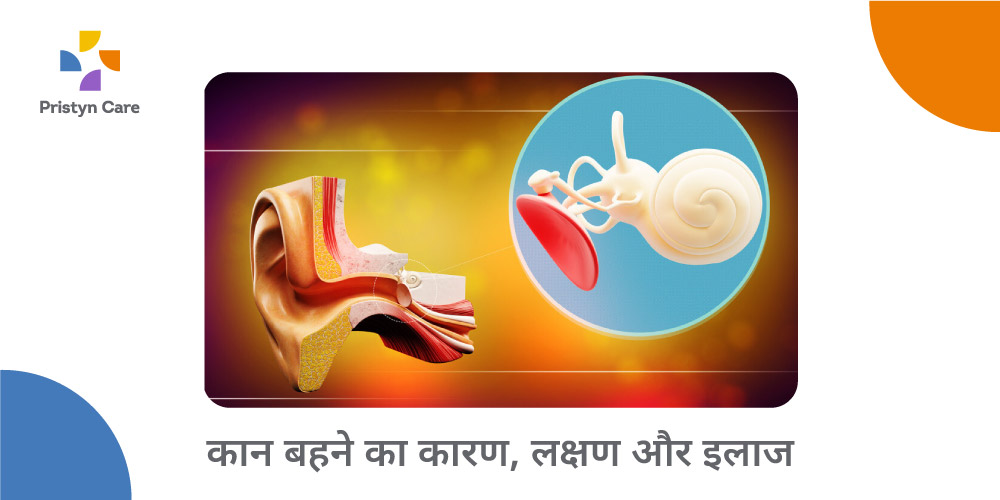Ear discharge can be caused by several types of infections or injuries. In this blog, we will determine the causes, symptoms, and the best course of treatment for ear discharge.

Table of Contents
What is Ear Discharge?
Ear discharge is a condition when fluid or pus is present in the ear canal. It is a common problem that can occur in both adults and children. Depending on the cause, the ear discharge can be clear, yellow, bloody, or thick.
Identifying the cause of ear discharge is important in order to treat the issue properly. Common causes of ear discharge include infection, injury, or a foreign body in the ear canal. In most cases, the issue can be resolved with antibiotics or other medications. In rare cases, surgery may be required to remove an object or treat an infection.
What are the Causes of Ear Discharge?
Ear discharge is a common occurrence that can be caused by different reasons, including,
Infections: Infections are the most common cause of ear discharge. Bacterial infections of the ear can lead to a yellowish or greenish discharge with pus that may have an odor, as well as itching, pain, redness, and swelling. Fungal infections, on the other hand, can cause a white, cottage cheese-like discharge that is odorless and can also lead to itching, pain, and redness.
A buildup of earwax: Blockage in the ear from built-up earwax, debris, or a foreign object can also cause ear discharge. This type of blockage can lead to a buildup of fluid behind the eardrum, which can then release a discharge. The discharge may be clear, white, or yellowish and may also be accompanied by itching, pain, and other symptoms.
Trauma: Trauma to the ear can cause a bloody or bloody-tinged discharge. This type of discharge can occur as a result of a tear in the ear canal, a ruptured eardrum, or an injury to the ear.
Dust allergies: Allergies can also cause ear discharge. This type of discharge is usually clear and odorless and can be accompanied by itchiness and pain in the ear. Chemical reactions, such as those that occur with certain kinds of ear drops, can also lead to ear discharge.
Ear discharge should always be treated by an experienced ENT surgeon to determine the underlying cause and the best treatment.
What are the Warning Signs of Ear Discharge?
Ear discharge is a common symptom of various ear disorders and is usually caused by a buildup of fluid in the middle ear. It is important to be aware of the warning signs of ear discharge as it can indicate a more serious health condition that requires medical attention.
Common warning signs of ear discharge include a feeling of fullness or pressure in the ear, muffled hearing, ringing in the ear, drainage from the ear, pain or itchiness in the ear, and a foul smell from the ear. If you experience any of these symptoms, it is best to seek medical advice as soon as possible.
If you experience sudden hearing loss, it could be a sign of hearing loss due to ear discharge. In addition, if you experience a feeling of dizziness or vertigo, this could also be caused by a buildup of fluid in the ear.
If you experience any of the warning signs of ear discharge, it is best to seek medical advice. Early diagnosis and treatment can help to reduce the risk of long-term complications.
What are Diagnosis and Treatment Solutions for Ear Discharge?
Diagnosis of ear discharge includes an examination of the eardrum, as well as a hearing test. Depending on the cause of the discharge, additional tests may be necessary to determine the exact cause. These tests may include an imaging scan of the ear, a CT scan, or a sample of the discharge sent to a laboratory for further examination.
When an infection is present, treatment usually consists of antibiotics or antifungal medications. In cases where the ear discharge is caused by an underlying medical condition, such as an autoimmune disorder or tumor, treatment for the underlying cause may be necessary.
It is important to seek medical attention if you experience any ear discharge, as early diagnosis and treatment can help prevent serious complications.
In severe cases, a doctor may suggest surgical treatment depending on the root cause of the ear discharge.

How to Prevent Ear Discharge?
Ear discharge can be an uncomfortable and concerning issue. However, there are ways to prevent it from happening. Below are some tips for preventing ear discharge:
- Avoid putting anything inside your ears. This includes cotton swabs, fingers, or other objects. This can push the wax further down into the ear canal and cause blockage.
- Clean the outside of your ears regularly. Use a washcloth with warm water and gently wipe around the ear. Do not use cotton swabs or other objects to clean your ears.
- Use a humidifier in your bedroom to keep your ears moist. This will help the ear wax move and prevent it from becoming too thick and causing a blockage.
- Avoid swimming in water contaminated with bacteria or other organisms. These may enter your ear canal and cause infection.
- Avoid using earplugs or headphones that are too tight or cause discomfort. These can push wax further down into the ear canal and cause blockage.
- Have your ears checked regularly by a doctor. This will help to identify any underlying issues that may be causing ear discharge.
By following these tips, you can help to prevent ear discharge and keep your ears healthy and functioning properly.







